Thanks for your support! If you make a purchase using our links in this article, we may make a commission. And, as an Amazon Associate, I earn from qualifying purchases. See the full disclosure here.
Updated April 12, 2024
People have often asked us how to buy a used RV from a private seller in or out of state. Most get tripped up by the logistic realities of what to do or obtaining everything they need to comply with various fees and, of course, laws. They don’t have the time or money to bounce back and forth trying to complete the purchasing process.
We’ll show you the best way to buy a used RV from a private seller remotely, so the only trip you need to take is the one where you get to pick up the RV. Come with us as we take you through a step-by-step, efficient process with your time and money. You’ll find answers to questions like:
- Can I finance an RV from a private seller?
- If I buy a trailer out of state, do I pay sales tax?
- How to get a temporary license plate when buying from a private seller?
- How do you write a bill of sale for an RV?
- What’s the safest way to buy an RV from a private seller?
How Do You Buy an RV From a Private Seller?
The key factors to buying an RV from a private Seller are research, preparation, and patience. RVs are the second biggest purchase you’ll make after a residential house. Depending on the price, you’re investing in something that costs more than your personal vehicle.
If the RV resides out of state, the purchase becomes more complex. So lay off the caffeine and be prepared for the process to take weeks. Taking shortcuts or skipping steps could result in problems later on.
For example, if you buy the coach without a proper RV inspection, whatever problems it has become yours. If the motorhome or travel trailer is still under the manufacturer’s warranty, only a handful of brands allow it to transfer to a second owner.
Can I Finance an RV From a Private Seller?
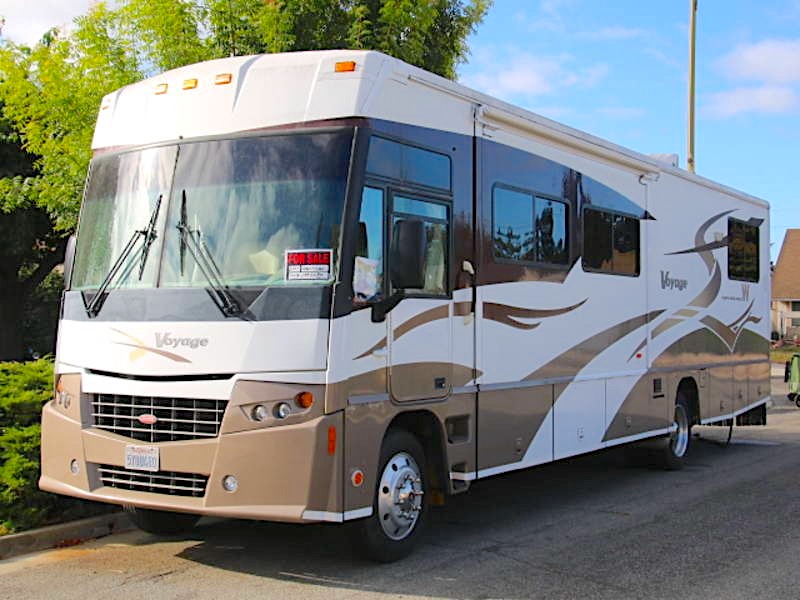
Check out our article, Are Old RVs Worth Buying, to learn how RV loans work in detail. It shows you the wide range of credit scores, required down payments, annual percentage rates (APR), term lengths, and other factors that make up these collateral borrowing products.
You should also know your credit score, debt-to-income ratio, and credit history. After shopping around for the best RV loan products, you’ll have enough information about your credit background to negotiate a better deal with your top three lenders.
Even if you get half of a percentage point less, that can add up to a significant amount of money in the long run. It could mean the difference between a worrisome monthly budget to, “Hey, we don’t have to give up pizza night.”
Ultimately, you’ll want to have an RV financing pre-approval letter. This document shows you the highest amount you can borrow, the monthly payment, the APR, and everything else about the loan.
It also proves to the private seller that you’re serious about buying. Sellers are motivated by people who come prepared and are willing to place a deposit rather than “window shoppers.” If you plan to buy an RV from a private seller, take your time, but don’t waste theirs.
Red Flags In Private RV Ads
The red flags in private RV ads are similar or the same as red flags on any private sale, regardless of what’s being sold. Doing your homework and trusting your gut’s always a good idea. If it sounds too good to be true, that’s because it probably is.
- The listing is vague, short on pics, and lacks information
- The seller demands cash up front, before delivery, or a chance for you to inspect the RV
- In the same vein, the seller refuses a third-party inspector
- Seller is difficult to get ahold of, talk to, or email
- The seller can provide no previous maintenance records
- The price is suspiciously low compared to the book value of the RV
- The seller demands personal information prior to you purchasing or having a look at the RV
- Online links are also suspicious
- The seller wants money to “hold” the RV
As long as you embrace common sense and go into any potential deal with a sense of suspicion, your mind will be alert to any shenanigans on the seller’s part. Take your time, do your homework, and never jump a huge deal because you let your excitement get the best of you.
Are Deposits Required for RV Loans?
Be ready to have skin in the game because lenders will require a deposit for the RV loan. Unless you have perfect credit above 800, have a long history with the bank, and carry multiple loans with them already (including your mortgage), you need to put down between 10%-30%.
The Seller will also want a deposit to take the RV off the market for you. The deposit will eventually become part of your down payment. Find out how much they want and if it’s refundable if the inspection shows issues that are beyond your resources.
And ask any other questions you may have. If the seller asks you to compromise outside your comfort zone, only you can decide if it’s worth it.
Are RV Inspections Worth the Money When Buying an RV From a Private Seller?
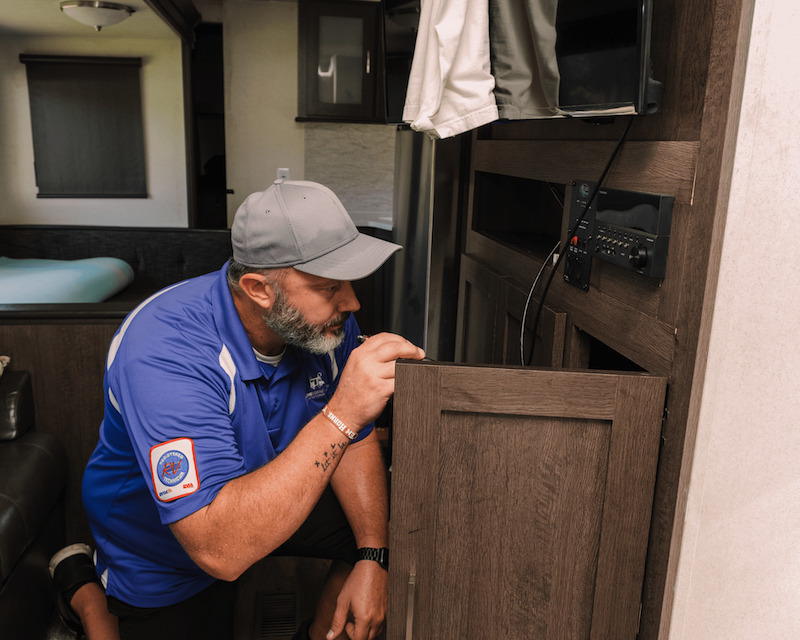
RV inspections are worth the money, even if you’re buying a coach right off the factory floor. The private Seller may have stayed on top of the maintenance, but there could be unknown issues. You can learn more about them and the different types of inspections in our feature article called Is an RV Inspection Worth the Cost?
If the motorhome or travel trailer is within driving distance, you could run through an RV inspection checklist yourself. However, to avoid the costs of an extra trip, you can search the National RV Inspector Association (NRVIA) website for a licensed RV inspector near the coach you’re looking to purchase. These professionals have the proper training, certifications, and insurance to look over the RV for you.
A level one inspection will give you a multi-page report that checks everything from stem to stern. The information is so detailed that they’ll even tell you if a particular vinyl square on the floor has become discolored due to sun bleaching.
The level two service, primarily designed for motorhomes, takes samples of the automotive fluids and sends them to a forensics lab. The results show how the engine, transmission, and other components operate based on contamination or other issues.
For example, the fluid test may reveal that the engine oil has water, which could indicate that the motorhome has a blown head gasket.
How Old Of An RV Should You Buy?
As a new RVer, you’ll hear about the “ten-year” rule from time to time. The rule is generally a hot topic, mostly because some RV campgrounds won’t allow an RV that’s more than ten years old.
“Some” is mostly applicable to bougie RV parks—the campground version of staying at the Burj Al Arab in Dubai. Ok, maybe it’s not that bad, but “upscale” is definitely a part of the equation.
Then there is the idea that buying an RV three to five years old avoids the headaches that new RVers often have to deal with. While you should hire a third party to inspect any used RV you purchase, most of the issues and failures on the RV are taken care of in that 3 to 5-year window.
Lastly, where do renovated, retro RVs fall into the equation? These are RVs that may be well past the above ten-year window but have since been renovated. That’s what makes a professional inspection so important.
You will be surprised at the fantastic deals you may find on a renovated, retro RV that’s more than a match for some of the modern options on the market.
Where Are the Best Places To Find Used RVs for Sale?
You can find used RVs for sale by owners or RV dealers nationally in several places. Each has pros and cons worth considering from the buyer’s perspective. These sources include:
- Online marketplaces that allow private sellers to list their RVs
- RV Dealerships like the Big 4 National Chains: Camping World, General RV, Lazydays, and RV Retailer
- RV consignment shops
- RV trade magazines
- Family, friends, neighbors, and of course, other RVers
For a complete list of the best places to buy a new or used RV check out our article called 25 Best Places to Buy an RV!
Buying an RV on Consignment
As seen in the Haylett RV video above, RV consignment lots can be secondary locations for dealerships. They can also be separate businesses.
If a private seller prefers a neutral agent to take care of the advertising and sales process, the consignment dealer sells the coach for the Seller. In return, the agent receives a portion of the sale for their efforts.
As a buyer, the consignment agent may help you with the retitling and registration paperwork if you live in the same state. If you flew in from a different state, they could help you figure out where to stay, eat, and other nearby things you may need while you’re there. Remember, the consignment agent works for the seller, not the buyer.
Should I Use an Escrow Agent When Paying Cash for an RV?
During an RV purchase, the buyer and seller have to develop a certain amount of trust. The buyer must trust that the seller won’t find a better deal and give the RV to someone else. The Seller must trust that the buyer will complete the transaction by paying the agreed-upon amount.
Using a third party to hold the buyer’s money in escrow could be a solution when buying an RV from a private seller out-of-state. Certain agencies are specially licensed to perform this type of service. Here’s how it works:
- The buyer transfers the entire purchase price amount, plus the escrow service fee, to the agency. The seller sends the bill of sale to delineate the details.
- The seller ships the RV to the buyer
- The buyer does a final inspection and takes delivery of the coach.
- The third-party agency transfers the purchase price funds to the seller closing the transaction.
Can I Register My RV in Another State?
One of the most problematic concerns concerns registering the RV once you have it. When you go pick up your RV, you can’t just drive off into the sunset; driving without a license plate or registration will usually get you pulled over and ticketed (or worse).
So, if you’re in Colorado in your new RV, but you hang your hat on the country roads of West Virginia, how are you going to get home legally?
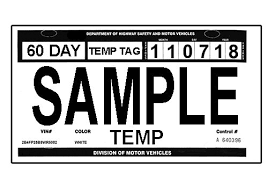
Every state allows you to purchase a temporary tag (also known as a moving permit). Bring the following with you to the local DMV in the area:
- The RV’s title with the previous owner’s signature releasing it for transfer
- Proof of insurance
- After that sale, your RV insurance agent can email or direct you to obtain the document through their website.
- Bill of Sale
- The registration if the state requires it
- Any other documentation the state requires
You’ll find temporary license plates for 1, 3, 30, 60, and 90 days. For logistic purposes, we recommend buying the 30-, 60-, or 90-day temp tag. You’ll want to give yourself enough time to get home and take care of the registration process while you’re balancing your daily routine.
Legally, you’re required to head straight home. But you’re also required to drive safely, so you want to use the 2-2-2 RV driving method. Therefore, take your time enjoying your new RV by setting up in a few campgrounds on the way home. It makes sense to us; how about you?
Do You Pay Sales Tax on Out-of-State Purchases?
You don’t pay sales tax on out-of-state purchases when you go to the DMV at the RV’s location. Instead, you pay it at your home state’s DMV when you’re registering it for the permanent license plate.
During your initial research, find the closest DMV for registering your RV. Not all of them have the capabilities. As you read in our article about RV inspections, there are different kinds of inspections.
One is a Department of Transportation (DOT) inspection required by federal and state law. This assessment only checks to see if the coach meets the minimum standards for traveling safely on the road.
You’ll want to look up your home state’s DMV requirements and have all of that paperwork together when you head for your appointment.
Many states ask for a certified weight of the coach. We recommend using the Cat Scale Locator to find the closest vehicle scale near you. The DMV recognizes Cat Scale certification.
Concession State DMVs
If the RV’s DMV is a Concession State, you may be able to take care of both your temporary tag and home state registration in one place.
These states have so many temporary residents; they adjusted the processes and laws that operate the DMV so that permanent residents from another state can register a vehicle in their home state but keep it in the Concession state.
For example, if someone from Iowa had a winter home in Florida and kept a car there, they could register the vehicle in Iowa even though the car would never leave Florida.
As a Concession State, Florida’s DMV can process the Iowa registration for that person (assuming Iowa allows it). The person will pay the Iowa state tax and receive an Iowa license plate. The bottom line: it’s a one-stop-shop for that Iowa Snowbird.
Do You Need a Bill of Sale for a Camper?
For a Bill of Sale to be legally acceptable, it needs to state some specific information. In some instances, a notary may need to stamp and sign it. Using the temporary tag website linked above, you’ll learn when you’ll need a notary on each state’s temporary tag webpage.
On a Bill of Sale, it needs the following:
- The agreed purchase price of the RV for both the buyer and Seller
- The name and address of the buyer and Seller
- That you are specifically selling a “Recreational Vehicle,” “Motorhome,” “Travel Trailer,” etc.
- Some states consider dirt bikes, snowmobiles, and ATVs as RVs, so be specific.
- Include the specifics of the RV
- Color
- Year
- Length
- Fuel Type
- Make
- Model
- Model Number
- Odometer Reading
- VIN Number
- Optional add-ons (hitches, tow bars, outdoor furniture, etc.)
- Include a statement that the Seller is selling the RV free and clear of liens and in the current condition
- The Date of the sales agreement
- Signatures and signature dates of both Buyer and Seller
- It’s a good idea to have one or two neutral witnesses
- Leave space if a notary needs to stamp it
- The notary signs inside their stamp
Make sure both the buyer and Seller get original copies of the agreement. Print two copies and each party should sign both of them. Photocopied signatures aren’t as legally binding as original signatures. Many websites have bill of sale templates you can use, so you don’t have to create your own.
If you want to buy an RV from a private seller, you will want a bill of sale.
Step by Step Directions to Buy a Used RV From a Private Seller
Now that you have a good explanation of the details, here’s a step-by-step guide that you can use as a checklist to walk you through buying an RV from a private Seller in or out of state.
Create a virtual folder on your computer that’s easy to find on your computer or also a mobile device to store all of your digital documents. Also, purchase a folder with a notepad you can bring with you to keep your printed paperwork, notes, and other things organized.
1. If Financing: Search for the Best Lenders that Meet Your Goals
- Pick your top 3 choices and compare them side-by-side using the following criteria:
- Maximum borrowing capacity
- Annual percentage rate (APR)
- Required down payment percentage and amount
- Maximum monthly payment
- Payment grace period days and late penalty fee
- Early pay-off penalty fee and minimum timeframe to avoid the penalty
- Print and save the pre-approval letter of the lender you choose
- If you’re paying cash and using an Escrow Agent, you should also print and save your agent’s information
2. Shop: Find the Used RV That Meets Your Needs and Wants
- Try before you buy using peer-to-peer RV rental websites like Outdoorsy, RVezy, or RVshare to find the category, floorplan, and features you want.
- Use online sources like:
- Look at RV Consignment shops.
- Ask family, friends, and also other RVers if they know anyone selling their coach.
3. Inspection: Have an RV Inspection Completed on Your Favorite Finalist
- Speak with the Seller directly
- Find out if the RV is still available?
- Ask how much of a deposit they want to hold for you?
- Is the deposit refundable, can it be used towards the purchase price, or is it a separate expense?
- Are they okay with you sending an RV inspector out?
- When would be a good time to send out the inspector so the Seller can give them access to the RV?
- If you don’t like the deal so far, have two other favorites in reserve.
- Contact nearby RV Inspectors using the NRVIA locator that’s local to the motorhome or travel trailer you want
- Let them know the situation.
- Get to know them to build trust
- Learn their professional and RV background
- Find out their pricing options
- Book the RV Inspector you like the best and inform the Seller when they’ll be coming out.
- The RV Inspector will send you and the Seller a detailed report after the inspection.
- Save it to your computer.
- If there isn’t an inspector in the area, locate an RV service center or an RV mobile repair service technician to look the coach over.
- RV service technicians have different certifications, but their training is close enough to provide the same details. Many RV service centers offer certified RV inspections.
- Run a background search on the RV
4. RV Insurance: Research the V Insurance Companies for the Best Quote
- Auto-Owners
- Geico
- Good Sam
- National General
- Nationwide
- Progressive
- Safeco- By Liberty Mutual
- Print and save the quote you like the best.
5. DMV: Research Your Home and the RV’s Out-of-State DMV Requirements
- Home state DMV
- Find out what documents and tasks you need to complete to register your RV in your home state.
- Save it in a document on your computer and print it out to keep it in your real-world folder if you want
- Find out what documents and tasks you need to complete to register your RV in your home state.
- RV’s State DMV for the temporary tag
- Use your favorite trip planner like RV Trip Wizard to locate the closest DMV where you can buy a 30, 60, or 90-day temporary tag/moving permit.
- Write down all the documentation you’ll need to show them.
- Save it in a document to your computer and put a printed copy in your folder to bring with you.
- If you’re buying it from a Consignment Shop, can they process your home state’s registration?
- If the RV is in a Concession State, find out if the consignment shop rep can process your out-of-state registration.
6. Final Purchase Price: Negotiate the Deal
- Find a bill of sale template for RVs online that covers all of the required information.
- Speak with the Seller and find a final price that both of you can agree upon
- Fill in all of the spaces on the bill of sale except the signatures and signature dates.
- Send a copy of the unsigned bill of sale to the Seller and print two copies of it for your folder to bring with you when you pick up the RV
- Another option is to sign both copies and send them to the seller with a return label via U.S. Mail, FedEx, UPS, or DHL.
- The Seller signs both copies and sends back one of them to you.
- You can do this only if you don’t need a notary’s signature.
- If you need a notary, the official has to witness both of you physically sign the document.
- Make travel plans to pick up your RV or have it shipped to you.
7. Paperwork: Complete the Documentation With the Seller
- Do a final inspection yourself of the RV
- Sign both copies of the bill of sale and give one copy to the Seller (if you didn’t do it already)
- Have the Seller sign the original copy of the title, making it transferable to you
- Make sure the registration they give you looks correct.
- Some states require that the registration stay with the owner of the license plate rather than the vehicle itself, so you may not need it. Your research on the state’s DMV will tell you whether you need it.
- Look through the RV’s document binder, verifying all of the current owner’s manuals, the previous bill of sales, and other relevant documents.
- Contact the RV insurance company you want to use and activate the coverage you need based on your home state.
- Make arrangements with the Seller to pick up the RV after you take care of the last steps.
- Have the insurance agent email it to you or show you where to obtain the “Proof of Insurance” documents on their website.
- Find a place where you can print the document out.
8. Temporary Tag: Go to the RV’s Local DMV For the 30/60/90 Day Temporary License Plate
- Arrange to pick up the RV the next day
- You’ll want a fresh start for the drive home
- Review what you need from your research and bring all the documents in your folder to the nearby DMV for the moving permit/temporary tag.
9. Take Delivery of Your RV
- Drop off your rental car (if applicable)
- Take an Uber/Lyft to your RV and enjoy the trip home.
- Don’t forget to attach the temporary tag.
- When you stop for lunch on the road, contact the DMV back home that handles RV and set an appointment about a week or two after you get home to give you time to complete their requirements.
- You might need to stop at a store to pick up food and RV essential accessories like hoses and other gear for the trip back home.
10. Home DMV: Complete the Registration Process
- If the other state took care of this, you could skip this step.
- Book the appointment and get your RV weighed at a Cat Scale
- Take care of any other preliminaries needed.
- Get the DOT inspection completed if the DMV outsources it.
- Show up to the DMV with all of your paperwork to complete the registration process.
- Be prepared to pay the sales tax for the RV
Is Buying an RV Through a Dealership a Good Idea?
Looking through these 10 steps, you might think buying an RV through a dealership is a good idea. If you had the experience, you might have questioned that dealer’s fee when you looked over the breakdown of your out-the-door price.
The dealer’s fee covers the various processing fees and relevant overhead concerns to take care of these steps for you. The steps aren’t complex, but they take time, and it can be frustrating waiting in line and having to come back because you misread something.
That’s why we stress the importance of reading things carefully and being patient. If you buy from a dealer rather than an RV from a private seller, you must be diligent and double-check everything.
Final Words About Buying An RV From a Private Seller
We hope this discussion makes the out-of-state or in-state RV buying process a better experience for you and your family. If you decide to buy an RV from a private seller you will want to do your homework.
An RV is a big financial commitment, and there are many important decisions to make. If you buy an RV from a private seller out of state, things can be even more complicated.
Related Reading:
– Is There a Kelley Blue Book for RVs and Campers?
– 10 Best Questions to Ask When Buying a Used Camper
– How Does RV Consignment Really Work?
– How Much Can You Negotiate on a Travel Trailer to Get a Great Price?
Mike Scarpignato – Bio
Mike Scarpignato created RVBlogger.com over five years ago in 2018 to share all we have learned about RV camping.
Mike is an avid outdoorsman with decades of experience tent camping and traveling in his 2008 Gulf Stream Conquest Class C RV and 2021 Thor Challenger Class A motorhome.
We attend RV Shows and visit RV dealerships all across the country to tour and review drivable motorhomes and towable trailers to provide the best evaluations of these RVs in our blog articles and YouTube videos.
We are 3/4-time RVers who created RVBlogger.com to provide helpful information about all kinds of RVs and related products, gear, camping memberships, tips, hacks and advice.
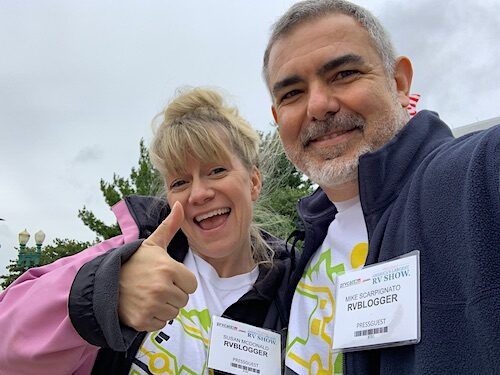

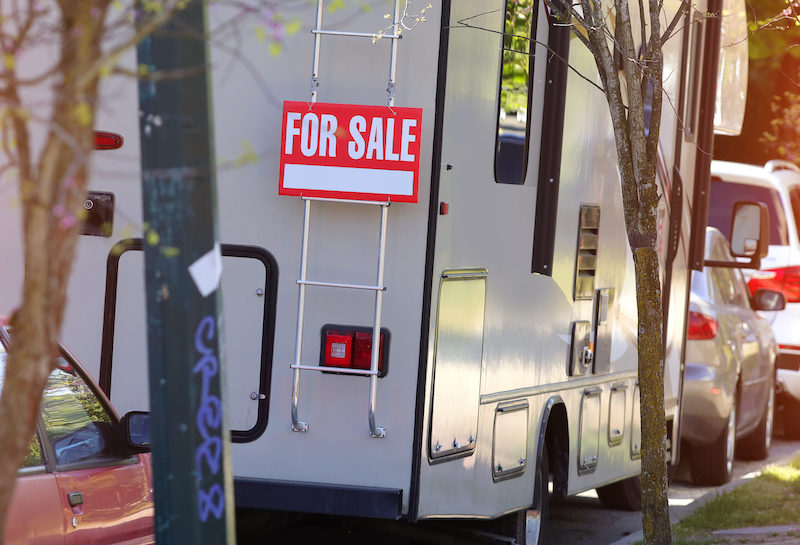
If you are speaking directly with the credit union there is trust involved. I did this and had no problem, but only after talking to them directly.
Thank you so much for taking the time to list all one should do when going through the process of procuring an RV with its Seller. It is quite a step-by-step procedure & yes, totally agree that getting an independent RV inspector to check out your future investment is 100% worth the money. It can provide further bartering points on obtaining the RV or at least let you know what’s really required to get the RV in shipshape. All that helps with making final decisions.
Your article is very detailed and worth saving. But there is one thing that I didn’t see covered. I am a cash buyer and the private seller owes money on the RV to a credit union who holds a lien on the title. The seller tells me that I need to pay them jn full so they can get the title lien released. This seems like too much trust. How can the seller get the lien released so that she can sell and transfer the title to me when i pay her the full puchase price?
I have that same situation. The seller ans RV are an 8 hr drive away. And both or our banks are 3 hrs from the seller’s house. How can I drive out there, inspect it, buy it and drive home the next day? And how am I assured the seller will send the title to me?